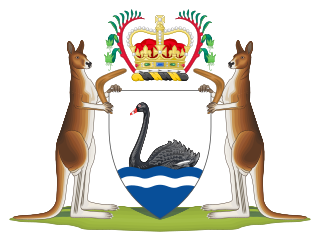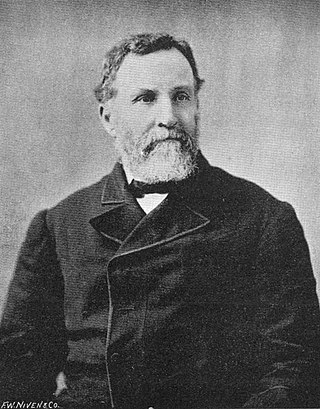Related Research Articles

The premier of Western Australia is the head of government of the state of Western Australia. The role of premier at a state level is similar to the role of the prime minister of Australia at a federal level. The premier leads the executive branch of the Government of Western Australia and is accountable to the Parliament of Western Australia. The premier is appointed by the governor of Western Australia. By convention, the governor appoints as premier whoever has the support of the majority of the Western Australian Legislative Assembly. In practice, this means that the premier is the leader of the political party or group of parties with a majority of seats in the Legislative Assembly. Since Western Australia achieved self-governance in 1890, there have been 31 premiers. Mark McGowan is the current premier, having been appointed to the position on 17 March 2017.

Sir Walter Hartwell James, was the fifth Premier of Western Australia and an ardent supporter of the federation movement.

Henry Daglish was an Australian politician who was the sixth premier of Western Australia and the first from the Labor Party, serving from 10 August 1904 to 25 August 1905. Daglish was born in Ballarat, Victoria, and studied at the University of Melbourne. In 1882, he worked as a mechanical engineer but soon switched to working in the Victorian public service. He first stood for election in 1896 but failed to win the Victorian Legislative Assembly seat of Melbourne South. He then moved to Subiaco, Western Australia, where he found work as a chief clerk in the Western Australian Police Department. In 1900, Daglish was elected to the Subiaco Municipal Council and in April the following year, he was elected to the Western Australian Legislative Assembly as the member for the newly created seat of Subiaco, becoming one of six Labor members in the Western Australian Legislative Assembly. The party elected him as its whip, and he resigned from the Subiaco council on 1 May 1901. On 1 December 1902, Daglish was sworn in as mayor of Subiaco, having been elected the previous month.

Sir Cornthwaite Hector William James Rason, better known as Hector Rason, was the seventh Premier of Western Australia.

John Scaddan, CMG, popularly known as "Happy Jack", was Premier of Western Australia from 7 October 1911 until 27 July 1916.
The Forrest Ministry was the first government ministry in Western Australia, after the inauguration of responsible government. It was in government from 29 December 1890 to 14 February 1901, when it was succeeded by the Throssell Ministry following the 1901 elections.

The Second Leake Ministry was the fifth Ministry of the Government of Western Australia and was led by Premier George Leake, who had hitherto been the Leader of the Opposition. It succeeded the Morgans Ministry on 23 December 1901 after a series of ministerial by-elections to confirm that ministry resulted in half of the ministry being defeated by Opposition and Labour candidates. On 24 June 1902, Leake died unexpectedly at age 45, and a week later, Walter James was chosen to replace him and the James Ministry was sworn in on 1 July 1902.
The Daglish Ministry was the 7th Ministry of the Government of Western Australia and was led by Labor Premier Henry Daglish. It succeeded the James Ministry on 10 August 1904 after the 1904 election boosted Labor's seat count from 8 to 22 in the 50-seat Legislative Assembly. As such it was a minority government and relied on the support of four independents.

Frederick Illingworth, was an Australian politician, who was a Member of Parliament in two Australian colonies, and a government minister in Western Australia. As a financer of land speculation in Victoria in the 1880s, he was heavily involved in the Victorian land boom.

George Randell was an Australian businessman and politician. He served intermittently in the Parliament of Western Australia between 1875 and 1910, including as a minister in the government of Sir John Forrest.
This is a list of members of the Western Australian Legislative Assembly between the 1901 election and the 1904 election, together known as the Fourth Parliament.
The Rason Ministry was the 8th Ministry of the Government of Western Australia and was led by Ministerialist Premier Hector Rason. It succeeded the Daglish Ministry on 25 August 1905 after the previous Labor minority administration fell on a vote of no confidence. On 7 May 1906, it was followed by the Moore Ministry led by Minister for Lands Newton Moore.
The Scaddan Ministry was the 11th Ministry of the Government of Western Australia and was led by Labor Premier John Scaddan. It succeeded the First Wilson Ministry led by Ministerialist Frank Wilson on 7 October 1911 after the decisive result of the state election held four days earlier, which had produced the State's first majority Labor government.
The Lefroy Ministry was the 13th Ministry of the Government of Western Australia and was led by Nationalist Premier Sir Henry Lefroy. It succeeded the Second Wilson Ministry on 28 June 1917 due to most members of the former Liberal Party, of which the previous Premier, Frank Wilson, had been the leader, pledging allegiance to the new party. The Lefroy Ministry, which was the first Coalition ministry in Western Australia, was also the only Ministry of a non-Labor government to be chosen by caucus.

The First Collier Ministry was the 16th Ministry of the Government of Western Australia and was led by Labor Premier Philip Collier. It succeeded the First Mitchell Ministry on 16 April 1924, following the defeat of the Nationalist government at the 1924 election on 22 March.
The Second Mitchell Ministry was the 17th Ministry of the Government of Western Australia and was led by Nationalist Premier Sir James Mitchell. It succeeded the First Collier Ministry on 23 April 1930, following the defeat of the Labor government at the 1930 election on 26 March.

The Minister for Education and Training is the member of the Government of Western Australia responsible for maintenance and improvement of Western Australia's system of education, and is answerable to the Parliament for all actions taken by the Department of Education under their authority. The holder of the office is usually an elected member of parliament from the ruling party or coalition, presently Tony Buti of the Labor Party.
William Charles Angwin was an Australian politician who was Deputy Premier of Western Australia from 1924 until 1927, and Agent-General for Western Australia in London from 1927 until 1933. Born in Cornwall, England, he worked as a carpenter and builder before moving to Australia. He was a founding member of the East Fremantle Municipal Council and a member of the Western Australian Legislative Assembly for the Labor Party from 1904 until 1927, representing the seats of East Fremantle and North-East Fremantle.

Matthew Lewis Moss KC was a lawyer and politician who served in the Parliament of Western Australia on three separate occasions – in the Legislative Assembly from 1895 to 1897, and in the Legislative Council from 1900 to 1901 and again from 1902 to 1914. He was a minister in the governments of Alf Morgans (1901), Walter James (1902–1904), and Hector Rason (1905–1906). Moss was born in New Zealand and arrived in Western Australia in 1891. He left for England in 1914 and spent the rest of his life there, although he maintained connections with Australia, on two occasions acting as Agent-General for Western Australia.

Mathieson Harry Jacoby was an Australian politician who twice represented the seat of Swan in the Legislative Assembly of Western Australia, from 1901 to 1905 and then again from 1908 to 1911. He was Speaker of the Legislative Assembly from 1904 to 1905. Outside politics Jacoby was a noted viticulturist, one of the pioneers of the West Australian wine industry.
References
- Black, David; Bolton, Geoffrey (2001). Biographical Register of Members of the Parliament of Western Australia, Volume One, 1870–1930 (Revised ed.). Parliament House: Parliament of Western Australia. ISBN 0730738140.
- de Garis, Brian (1991). "Self-Government and Political Parties". In Black, David (ed.). The House on the Hill: A History of the Parliament of Western Australia 1832–1990. Perth, Western Australia: Parliament of Western Australia. ISBN 0-7309-3983-9.
- Bolton, Geoffrey; Mozley, Ann (1961). The Western Australian Legislature, 1870-1930. Canberra: Australian National University. (no ISBN)